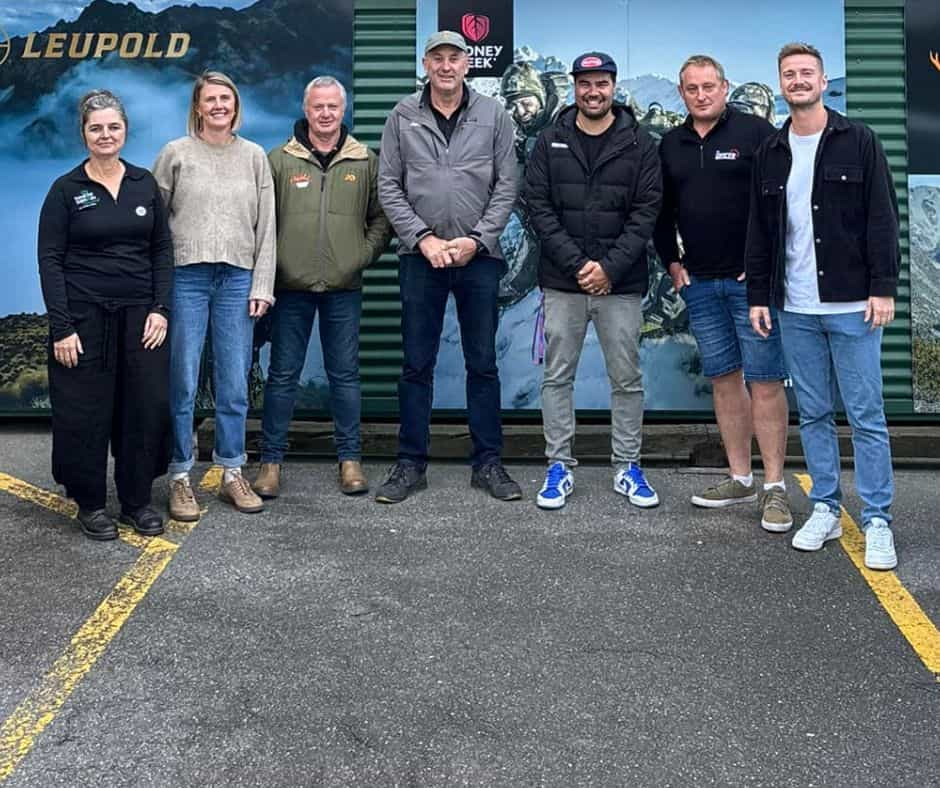
We Hunt Food a win-win for Murihiku
A community collaboration in Murihiku is aiming to support the environment and ensure quality free protein is provided for families through local food banks.
When Feeding Murihiku: Our Good Food Road Map was launched in 2024, its contents caught the eye of Tric Malcolm (Pou Ārahi/Executive Officer) from Kore Hiakai – not only because their kai research had been referenced in it – but because she knew of a protein waste problem down south and realised she could finally connect some people to make a difference.
Tric quickly contacted Rachel at Healthy Families Invercargill to connect with the Murihiku Kai Collective and see how this mahi could align.

Photo: Roy Sloan from the Fiordland Wapiti Foundation (FWF) speaks at the launch of We Hunt Food.
After a video call and a couple of emails Tric introduced Roy Sloan from the Fiordland Wapiti Foundation (FWF) to the team, and from there the story grew.
Wapiti numbers in Fiordland have increased significantly, causing the deer species to become environmental pests. The FWF cull Wapiti deer from Fiordland in partnership with DOC to help preserve the environment, with the meat well known for its high nutritional value.
The group had been looking for partners to help solve the problem of waste created via culling, find a cost-effective solution to professionally processing the meat, and ensure it was distributed to where it was needed most.
Often hunters are unable to use all the venison themselves, and there are food safety restrictions on donating home killed/self-butchered meat through agencies or KiwiHarvest. The unnecessary disposal of good food had been an ongoing bug-bear and a problem the Foundation was keen to solve.
After Tric contacted Healthy Families, a sub-group of the Murihiku Kai Collective and Systems Innovator Rachel met with Roy to map out how they could help facilitate this process. This naturally involved looping in Jennifer from KiwiHarvest Invercargill to solve the storage and distribution problem, and Kai Coordinator Steve Broad to help support the communication streams.

Photo: The launch of We Hunt Food in Invercargill
The Healthy Families team are supporting FWF via engaging support from their network of kai leaders, arranging media broadcasts, press releases in local publications and will work to create additional fundraising opportunities via their connections in the community kai space and story-telling opportunities.
There has been an enormous amount of donated time, heart and skills already gifted to the initiative from the Fiordland Wapiti Foundation, but the ongoing pressure to find committed sponsors and come up with fundraising initiatives to keep the venison processing costs paid will be the challenge.
Whilst the group will initially process the meat into mince, it’s hoped that in the future meat patties and sausages will also be possible.
Asked about their involvement, and what difference this donation will make to communities, Jennifer from KiwiHarvest said: “We are rescuing 270,000kg a year in Southland and redistributing to 34 agencies. The need is worse than it was pre and during Covid. We’ll work with We Hunt Food Charitable Trust as far as distribution goes - collect the meat from the butcher and we will store it frozen, distribute in our refrigerated truck. It means good healthy protein on people’s tables that they may not have had otherwise. Meat is hard to come by, and expensive, so often a lot of families will miss out on that protein. It’s an amazing initiative on that environmental side that helps those in need too. So, we’re delighted to work with We Hunt Food”.
Roy Sloan (General Manager Fiordland Wapiti Foundation) said the project was a no brainer: “The current economic situation and rising unemployment is putting pressure on families, forcing growing numbers to turn to food banks for help. The food banks tell us that the hardest food product to source is red meat. The We Hunt Food Trust has the solution. At the moment, deer numbers are high, and hunters are under pressure to control populations to help protect the environment. While they are doing well by culling thousands of animals, they are concerned healthy free-range venison is going to waste. We just wanted to join the dots, and it makes perfect sense to donate the excess venison to those who need it. It is a win-win situation – the Trust can provide needy families with meat by giving it to food banks while helping achieve our conservation goal of reducing deer pressure on native forests.”
Kai Coordinator Steve Broad said that the initiative showed the value of the Good Food Road Map as a reference for Murihiku, and the impact of a whole-of-community approach.
“We know there are people with the skills, the want, the time in this kai space. If we can connect them, help with resources, structure, sustainability and elevating their amazing mahi so others will also help – we know we’ve done our job.”
The Healthy Families Invercargill team have also captured the problem-solving process to share with other sites.
Article added: Thursday 20 March 2025